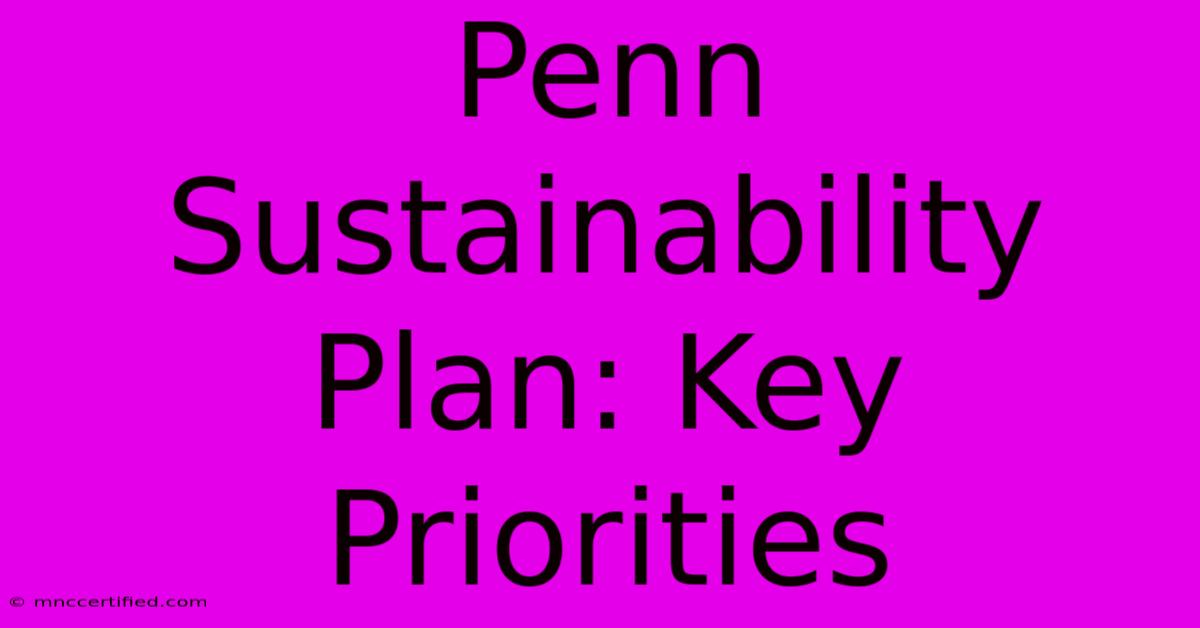Penn Sustainability Plan: Key Priorities

Table of Contents
Penn Sustainability Plan: Key Priorities for a Greener Future
The University of Pennsylvania has committed itself to a comprehensive sustainability plan, aiming to significantly reduce its environmental footprint and contribute to a more sustainable future. This commitment isn't just a statement; it's a roadmap guided by specific, measurable priorities. Understanding these key priorities is crucial for anyone interested in Penn's environmental initiatives and how they contribute to broader sustainability goals.
Core Pillars of Penn's Sustainability Plan
Penn's sustainability efforts are built upon several interconnected pillars, each addressing crucial aspects of environmental responsibility. These pillars aren't isolated initiatives but rather integrated strategies working in synergy to achieve maximum impact. Let's delve into some of the key priorities:
1. Climate Action & Carbon Neutrality
This is arguably the most prominent priority. Penn aims for carbon neutrality across its operations by a specific target date (check the official Penn Sustainability website for the most up-to-date information). This ambitious goal requires a multifaceted approach:
- Renewable Energy Sources: Investing in and transitioning to renewable energy sources like solar and potentially wind power is paramount. This includes installing solar panels on campus buildings and exploring partnerships for off-site renewable energy procurement.
- Energy Efficiency: Significant efforts are focused on improving energy efficiency across all campus buildings. This involves upgrading building systems, implementing smart energy management technologies, and promoting energy-conscious behaviors among students and staff.
- Reducing Greenhouse Gas Emissions: Penn is actively working to reduce emissions from various sources, including transportation, waste management, and heating systems. This involves promoting sustainable transportation options, improving waste diversion programs, and transitioning to low-carbon heating sources.
2. Sustainable Operations & Waste Management
Penn's commitment extends beyond emissions reduction to encompass responsible waste management and sustainable operational practices. Key initiatives include:
- Waste Diversion: Increasing the rate of waste diversion from landfills through recycling, composting, and other waste reduction strategies is a core objective. This involves improving waste sorting infrastructure and educating the campus community about proper waste disposal methods.
- Sustainable Procurement: Penn is committed to prioritizing sustainable procurement practices, favoring products and services with lower environmental impacts throughout their lifecycle. This encompasses everything from building materials to office supplies.
- Green Building Design & Construction: New construction and renovations on campus are guided by LEED (Leadership in Energy and Environmental Design) standards, ensuring environmentally responsible design and construction practices.
3. Sustainable Transportation
Reducing transportation-related emissions is a significant component of Penn's sustainability plan. The university is actively working to:
- Promote Alternative Transportation: Encouraging the use of public transportation, cycling, and walking through improved infrastructure, incentives, and educational programs.
- Reduce reliance on Single-Occupancy Vehicles: Implementing policies and programs to discourage the use of single-occupancy vehicles on campus and promoting carpooling and ride-sharing options.
- Electrification of the Fleet: Transitioning to electric vehicles within Penn's own fleet of vehicles is another crucial element of their plan.
4. Research & Education
Penn recognizes the crucial role of research and education in advancing sustainability. Key efforts include:
- Sustainability Research: Funding and promoting research projects focused on climate change, renewable energy, and other sustainability-related topics.
- Sustainability Education: Integrating sustainability into the curriculum across various disciplines and offering educational programs for students, faculty, and staff.
- Community Engagement: Collaborating with local communities on sustainability initiatives to extend Penn's impact beyond its campus boundaries.
Measuring Progress and Transparency
Penn’s commitment to sustainability is not merely aspirational. The university regularly publishes reports detailing its progress toward its goals. These reports provide transparent and measurable data, allowing stakeholders to track advancements and identify areas for improvement. Referencing these reports provides a comprehensive understanding of the tangible impact of Penn's sustainability initiatives.
Conclusion: A Collaborative Effort
Penn's sustainability plan is a comprehensive and ambitious undertaking, requiring collaborative efforts from students, faculty, staff, and the broader community. By prioritizing climate action, sustainable operations, responsible transportation, and impactful research and education, the university is actively working towards a greener future, setting an example for other institutions and contributing to global sustainability efforts. Regularly checking the official Penn Sustainability website for updates is crucial to stay informed about the latest progress and initiatives.

Thank you for visiting our website wich cover about Penn Sustainability Plan: Key Priorities. We hope the information provided has been useful to you. Feel free to contact us if you have any questions or need further assistance. See you next time and dont miss to bookmark.
Featured Posts
-
Clinton On Oslo Crystal Conversation
Nov 21, 2024
-
How Much Is A Bottle Of Opus One
Nov 21, 2024
-
14 42 An Hour Is How Much A Year
Nov 21, 2024
-
Janettes Savage Comment To Aljaz
Nov 21, 2024
-
Insurance Fraud Texas Penal Code
Nov 21, 2024